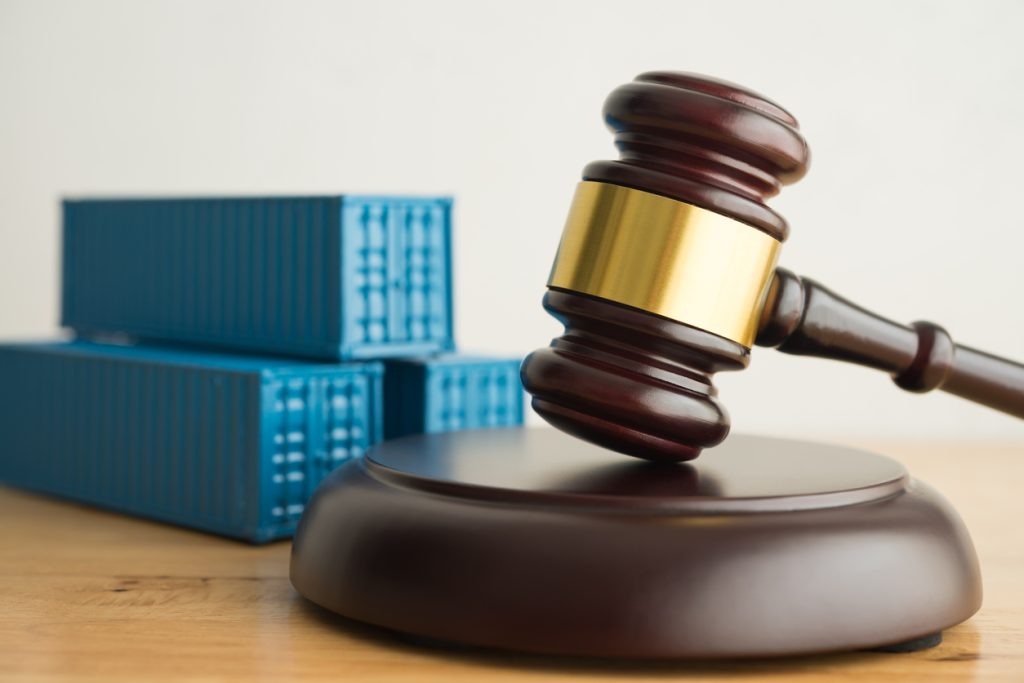From barges and offshore rigs to dockyards and shipping channels, maritime workplaces present unique hazards that can result in life-changing injuries. As a maritime worker, you may have essential protections under federal maritime law if you are hurt on the job.
At Winocour Law, our uncompromising, trial-tested attorneys help injured workers pursue appropriate legal action and fair compensation for medical bills, lost income, and other losses. Keep reading to learn about this process and how a Dallas maritime injury lawyer can help you rebuild and move forward after a devastating—and preventable—accident.

Who Qualifies for Legal Protections Under Maritime Law?
Not all maritime workers are treated the same under the law. Depending on your job duties and workplace, differing legal guidelines may apply.
Workers who are typically covered under federal law include:
- Offshore oil rig workers
- Longshore and harbor workers loading or unloading ships
- Seamen and crew members aboard commercial or private vessels
- Maritime construction workers on inland waters like the Trinity River
Because these categories may fall under different statutes, it’s essential to speak with a maritime injury lawyer to discuss your situation and the best way to proceed after a workplace injury.
Key Maritime Laws That May Affect Your Case
Several federal laws provide different levels of protection depending on a worker’s classification, job duties, and the relationship between the worker and the vessel.
The Jones Act
This law allows seamen to bring claims against an employer for negligence that contributed to an injury. In some cases, the Jones Act may also apply to vessel owners.
Longshore and Harbor Workers’ Compensation Act (LHWCA)
The LHWCA covers individuals who work around ships and docks, but do not qualify as seamen, including crane operators and port workers.
General Maritime Law
If a vessel is unsafe due to poor maintenance, inadequate crew training, or defective equipment, such claims of unseaworthiness likely fall under general maritime law.
Death on the High Seas Act (DOHSA)
If a fatal injury occurs more than three nautical miles from shore, the DOSHA may apply. It allows surviving family members to bring claims for economic damages.
Injuries in maritime settings are complex and require skilled legal guidance. Maritime injury lawyers at Winocour Law will carefully assess the details to determine how your case fits into these legal frameworks and advise you accordingly.
Maritime Accidents and Injuries
Whether on open water, at port, or aboard a stationary offshore platform, the risks facing maritime workers are significant.
Common incidents in maritime environments include:
- Slips, trips, and falls on wet or unstable surfaces
- Injuries from heavy machinery or malfunctioning equipment
- Burns, electrical shocks, and crush injuries
- Chemical exposure and inhalation of toxic substances
These accidents can result in long-term or catastrophic injuries, such as:
- Traumatic brain injuries (TBI)
- Spinal cord damage or paralysis
- Amputations and limb injuries
- Psychological trauma including PTSD
- In extreme cases, death of the worker
These types of catastrophic injuries not only affect a person’s ability to work but may also impact long-term quality of life. This often places a heavy physical strain on the injured worker, along with emotional and financial challenges for both them and their families.

What Causes Maritime Injuries?
Maritime injuries are often the result of unsafe practices or employer negligence. Problems include inadequate safety protocols, poor emergency training, and a lack of proper oversight. Poorly-maintained vessels or faulty machinery also endanger maritime workers.
Worker fatigue also contributes to maritime injuries. Understaffed or overworked crews can make dangerous mistakes and take safety shortcuts. Some employers may not adequately communicate hazards, risking the health and safety of unsuspecting maritime workers.
Your Legal Rights: Maintenance, Cure, and More
Federal maritime law provides important protections that may offer compensation during recovery. Here, we explain how these may apply to your specific situation.
Understanding “Maintenance and Cure”
Under maritime law, injured seamen are generally entitled to maintenance and cure benefits. Maintenance refers to the basic daily living expenses a worker needs while they are unable to work, like food and housing.
Cure covers the cost of necessary medical treatment related to the injury. These benefits are provided regardless of who was at fault for the accident and typically continue until the worker reaches maximum medical improvement. That is the point at which no further medical treatment is expected to improve their condition.
Jones Act Protections for Seamen
If unsafe conditions, lack of training, or another form of employer carelessness contributed to the accident, the injured seaman may be entitled to file a claim. These claims can seek compensation for a range of losses, including medical expenses, lost wages, and pain and suffering resulting from the injury.
LHWCA Coverage for Non-Seamen
Although this law functions differently from the Jones Act, it offers similar protections in terms of covering medical treatment and lost income. The LHWCA has its own specific filing deadlines and eligibility rules. For that reason, injured workers must act promptly after a job-related injury.

Jonathan Winocour, Founder and Principal Attorney
Jonathan Winocour is a dedicated advocate for maritime workers and their families affected by offshore accidents, vessel injuries, and workplace incidents throughout Texas waterways.
With over 20 years of trial experience, Jonathan has successfully secured substantial compensation for clients facing catastrophic, life-altering maritime injuries—including multimillion-dollar settlements in cases involving offshore rig accidents, vessel collisions, and employer negligence under the Jones Act and general maritime law. His compassionate approach to client care is matched by strategic legal insight and relentless courtroom advocacy.
A Diplomate of the National Institute of Trial Advocacy and a Top 100 Trial Lawyer, he has built a strong reputation for litigating complex maritime injury claims, including cases involving offshore platform accidents, longshore injuries, and seamen hurt aboard commercial vessels. His $4 million settlement for a worker injured in a maritime accident and his successful litigation against vessel owners and maritime employers underscore his ability to handle the nuanced medical, legal, and financial challenges maritime injury victims face.
Mike C. Miller, Of Counsel
Mike C. Miller is an esteemed trial lawyer with more than 40 years of experience handling serious maritime injury cases—including offshore accidents, vessel explosions, industrial maritime incidents, and injuries caused by unsafe working conditions on ships and platforms.
As Of Counsel at Winocour Law, Mike brings deep institutional knowledge and litigation firepower to the firm’s most complex maritime personal injury matters. He is board certified in Personal Injury Trial Law and has earned an AV Preeminent rating for his ethical standards and trial skills over decades of legal practice.
Throughout his career, Mike has secured multiple seven-figure verdicts and settlements in catastrophic maritime injury cases, including those involving offshore rig accidents, vessel collisions, Jones Act claims, and maritime brain trauma. His hands-on approach to building compelling cases—from analyzing maritime safety records to dismantling corporate and vessel owner defenses—has made him a go-to trial lawyer for cases where the stakes are life-changing for maritime workers and their families.

Talk to a Dallas Maritime Injury Lawyer
At Winocour Law, we understand the complexities of maritime law and the unique challenges faced by workers across Texas waterways, from the Gulf of Mexico to local docks and inland ports. We also handle recreational boating accidents and cruise ship injuries. Our trusted Dallas personal injury lawyers know how to approach injury cases involving unique legal jurisdictions and overlapping state/federal considerations.
Maritime workers play a critical role in keeping industries and communities moving, and they deserve knowledgeable support and advocacy when injuries disrupt their lives. Contact us to schedule a free, no-obligation consultation to review your case.
Frequently Asked Questions
What qualifies as a maritime injury?
They include any injury that occurs while working in or around navigable waters, including offshore platforms, vessels, or docks.
Am I eligible for compensation under the Jones Act?
If you’re a seaman who spends significant time on a vessel in navigable waters, you may be eligible. A consultation with a maritime injury lawyer will provide more insight about your situation.
What is the difference between the Jones Act and LHWCA?
The Jones Act protects seamen, allowing them to sue their employers for negligence and seek compensation for a wide range of damages. The LHWCA covers maritime workers who aren’t seamen, providing no-fault workers’ compensation benefits but limiting the types of recoverable damages.
Can I sue my employer if I am covered under maritime law?
Yes. If negligence contributed to your injury, you may have grounds to file a claim under the Jones Act or general maritime law.
What does it cost to hire a maritime injury lawyer in Dallas?
At Winocour Law, we believe cost should never be a barrier to justice. We offer free, no-obligation consultations, and we work on a contingency basis. That means no legal fees unless we win your case.





